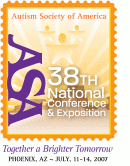 |
The ASA's 38th National Conference on Autism Spectrum Disorders (July 11-14, 2007) of ASAThe Westin Kierland Resort & Spa, Scottsdale, AZ |
| For a complete author index with session numbers, please click here | |
| Thursday, July 12, 2007: 3:00 PM-4:15 PM | |||
| Herberger Ballroom 2 | |||
| #2497- Career Paths in Adult Services: Creating Long Term Staff through Training, Support, and Professional Development* | |||
| Employees in adult services are less likely to have an educational background or experience with autism. Adult service organizations can implement training options that foster and promote professionalism, ultimately benefiting both the program and the staff. This presentation discusses successful strategies and practices for training, supporting, and retaining long term direct care staff in adult services. Areas covered include initial training experience, ongoing professional development, team building, and additional incentives. | |||
| Presenters: | - Jamie Douglas is the Managing Director of Adult Services for Eden Services in Princeton, New Jersey, currently providing employment and residential services to 94 adults with autism. Ms. Douglas has 27 years of experience which includes supervision of residential, respite, and home program services; coordination of parent training; and consultative services.
- Yasmin Qazilbash is currently the Coordinator of Operations for Eden W.E.R.C.s in Princeton, New Jersey. She has ten years experience in the autism field including supervision of several employment centers, recruitment and training of direct care staff, and leadership development for current and potential supervisory staff. Ms. Qazilbash’s experience also includes providing consultative services and vocational development to individuals on the autism spectrum and their families. Ms. Qazilbash received her B.A. from Trenton State College and her Master’s Degree in Educational Administration from Rider University. | ||
|
| |||
|
A. Initial training a. Creating a “family” atmosphere b. Mentoring program c. Skill Assessments and Feedback B. Ongoing training a. Interactive staff meetings b. Inservice trainings c. Requiring staff input i. Progress reports ii. IHPs iii. Troubleshooting curriculum d. Self evaluations for experienced staff C. Additional Incentives – “growing roots” a. Lateral movement b. Small promotions c. Reinforcement i. Staff enhancement ii. Employee of the month iii. Parent sponsored “Employee of the Year” (Kristen Ann Culley Award) iv. Observing landmarks (birthdays, anniversaries) Presentation Summary Inadequate and below standard staffing is endemic to the adult services industry. The lack of sufficient funding to provide professional level salaries forces organizations to pull from a hiring pool that competes with a job market paying little more than minimum wage. This means possible hires are less likely to have an educational background or experience with autism. Although this creates a less than desirable starting point, organizations can implement training options that foster and promote professionalism, ultimately benefiting both the program and the staff. Most organizations will offer an initial training program, however consistent follow up is necessary for successful integration of knowledge into practice. A mentoring program provides the employee with a vital resource in the form of an experienced staff who is able to impart ongoing clinical training and anecdotal information as well as introducing the new employee to the informal culture of the organization. The relationship is mutually beneficial as the mentor gains new experiences and skills (as well as a small monetary bonus). Being chosen as a mentor is a formal recognition of one's experience, knowledge, and positive influence on the program. Consistent feedback, both written and verbal, is essential to the success of all staff. New staff are formally assessed monthly during the orientation period by their supervisor and other administrative staff. Experienced staff are asked to complete self evaluations and identify a goal(s) for further improvement. Supervisors work with staff to identify goals that are consistent with the program's mission and direction. Weekly staff meetings are structured so as to require staff interaction as opposed to being strictly informational. Staff participate in discussions involving participant data analysis, troubleshooting teaching programs, and developing IHPs. Initial progress report drafts are written by the teachers and then edited together with the center supervisor. In order to provide ongoing support and training, inservices are scheduled year round. Topics vary from state and federally required standards to staff requested trainings on advanced teaching and informational discussions. Historically, educational careers offer little in the way of advancement or growth opportunities unless the individual is interested in making a departure from teaching to administration. This, as well as teacher “burn out”, often depletes the amount of experienced staff involved in direct teaching. Incentives to remain in a teaching position include offering opportunities for lateral movement, small promotions that combine teaching with additional responsibilities, and specialized teaching positions. Finally, there isn't enough that can be said for the value of positively reinforcing our teaching staff. From providing coffee and donuts at staff meetings to formally recognizing individual achievement, there are countless small but meaningful ways to ensure staff feel needed and appreciated. Maintain a database of employee birthdays and anniversaries and observe each with a card. Consider outside resources as well, such as having a parent sponsor an “Employee of the Year”. The presentation will go into depth on all these aspects of promoting professionalism among teaching staff and include concrete examples of successful practices. The intent is to provide adult service providers with real solutions to human resources challenges in the autism field. |
|||
See more of General Submissions
See more of The ASA's 38th National Conference on Autism Spectrum Disorders (July 11-14, 2007)